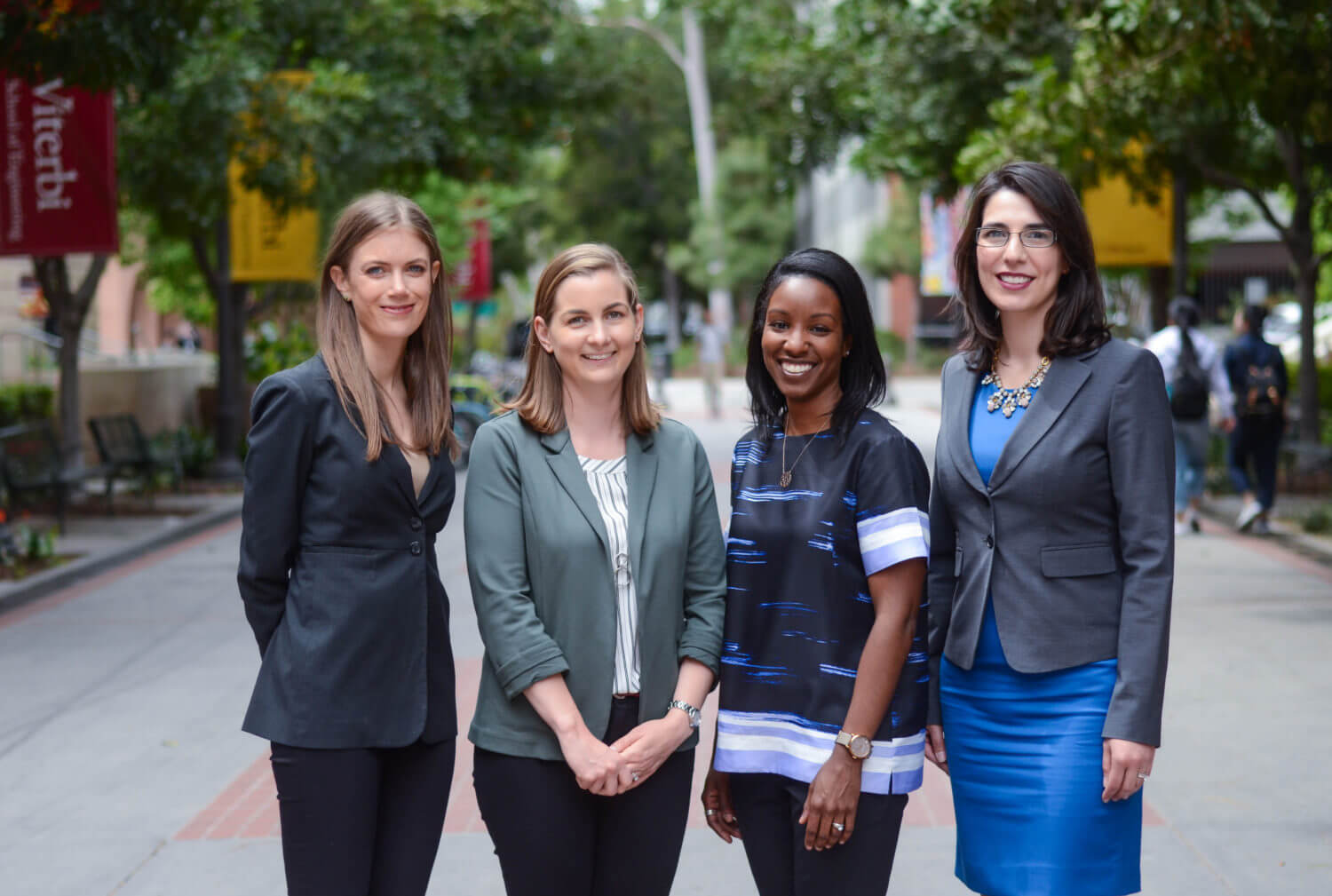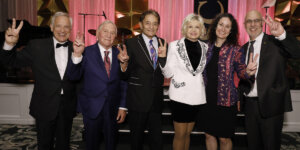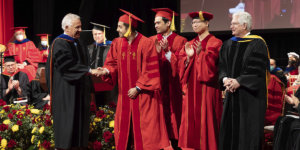
From left: Kelly Sanders, Megan McCain, Stacey Finley and Nora Ayanian, who were recently appointed to an Early Career Chair. Photo/Peter Shin
Four USC Viterbi junior faculty have been honored with an endowed chair: Nora Ayanian, assistant professor in the Department of Computer Science; Stacey Finley and Megan McCain, both assistant professors in the Department of Biomedical Engineering; and Kelly Sanders, assistant professor in the Sonny Astani Department of Civil and Environmental Engineering.
“The development and support of all our junior faculty at Viterbi is of the highest priority to the school,” said USC Viterbi Dean Yannis C. Yortsos. “Today, it is gratifying that four stellar women junior faculty in Viterbi are recipients of Early Career Chairs. Their accomplishments and promise augur well for them to become the future thought leadership of the school.”
An endowed chair is a position supported by a donor’s endowment and is one of the highest honors a university can bestow on a faculty member. The funding recognizes the individual’s leadership in his or her field and can help support research and other endeavors.
“We want to publicly recognize outstanding accomplishment and promise for young faculty, especially those who have already received prestigious external awards,” said Timothy Pinkston, USC Viterbi’s vice dean for faculty affairs. “Providing these chairs is one way to do that.”
Nora Ayanian
Ayanian, who was named holder of the Andrew and Erna Viterbi Early Career Chair, researches multirobot coordination. She directs the Automatic Coordination of Teams Lab, which is housed within USC Viterbi’s Robotics and Autonomous Systems Center. Her research explores end-to-end solutions for coordination—for example, using inputs from a tablet to control multiple robots.
“Teams of robots can do all kinds of things in areas where they’re not doing anything right now,” Ayanian said, including tasks that are unsafe for humans to perform.
Her work has applications for home automation, environmental monitoring and the military. Ayanian was also named one of the Popular Science’s “Brilliant 10” in 2015 and one of MIT Technology Review’s “35 Innovators under 35” in 2016.
Stacey Finley
Finley received the honor of Gordon S. Marshall Early Career Chair, which commemorates the late USC trustee, retired chairman of the board and namesake of the USC Marshall School of Business.
As director of the Computational Systems Biology Lab, Finley designs computational models to study angiogenesis in cancer patients. Her goal is to understand how the growth of tumors is supported by vessels carrying oxygen and nutrients.
Finley received a prestigious NSF CAREER Award in 2016. In April 2017, she was honored with WiSE’s Hanna Reisler Mentorship Award, which recognizes outstanding professional mentorship for women in science and engineering. Finley also recently received the inaugural Leah Edelstein-Keshet Prize from the Society of Mathematical Biology.
Megan McCain
McCain, who directs the Laboratory for Living Systems Engineering, was named holder of the Chonette Early Career Chair. Since joining the USC faculty in 2014, she has helped grow the university’s research on cellular systems and molecular bioengineering.
Her work with “organs on chips” houses human cells in micro-environments that mimic organs native to the human body.
“We want to basically build little pieces of human tissue in the lab that we can use for drug-screening and personalized medicine,” she said.
McCain was recently honored with a 2017 Cellular and Molecular Bioengineering (CMBE) Rising Star Award and an American Heart Association Faculty Award.
Kelly Sanders
Sanders received the honor of the Dr. Teh Fu Yen Early Career Chair, which commemorates a former USC Viterbi professor of environmental engineering, who served the school for more than four decades.
As director of the Sustainable Systems Group, Sanders aims to reduce the environmental impact of providing water and energy services. Using technical, regulatory and market intervention, she studies ways to ease tensions between human and natural systems.
Sanders was named one of MIT Technology Review’s “35 Innovators Under 35” in 2016.
“The Viterbi School is excited to recognize talented people from diverse backgrounds, who are themselves helping the school achieve higher levels of excellence,” said Pinkston, the vice dean for faculty affairs.
“They represent the ‘changing face of engineering,’” said Yortsos. “Which everyone in Viterbi is strongly committed to advancing.”
Published on May 1st, 2017
Last updated on May 13th, 2023










